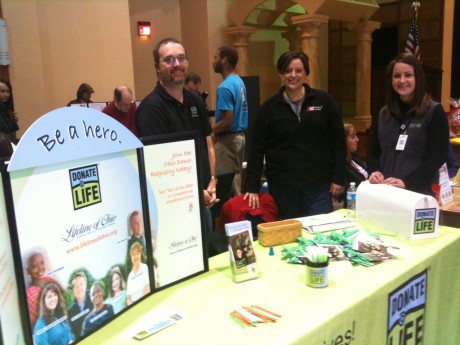Sharing the Donate Life Message
I think health fairs are great. You usually get some incentive for attending, perhaps a reusable shopping bag to carry the swag given out by vendors or, if you’re really lucky, a snack!
As a new Lifeline of Ohio employee, my incentives for attending health fairs are to educate the public about organ and tissue donation and to hopefully sign people up in the Ohio Donor Registry by sharing the Donate Life message.
I worked my first health fair a few weeks ago, not long after attending the Let’s Talk Level 1 Ambassador Training workshop, where my colleagues presented very clever role-play scenarios that might occur while staffing at a health fair.
When I got to the health fair, I was nervous about how I might engage the public in conversation, but I was lucky enough to have very knowledgeable people by my side. Sara, our community education coordinator, joined me for the day and was very good at starting the conversation with health fair attendees by asking, “Are you a registered organ and tissue donor?”
We were also joined by Donate Life Ambassadors including a lung transplant coordinator and a living kidney donor. Our ambassadors were a great resource to those who approached our booth who told us that they thought about signing the Ohio Donor Registry, but had a few questions they needed answered first.
One of the most common misconceptions that people asked me was, “Will doctors work hard to save my life if I am a registered donor?” I have heard this one a lot and I used to be curious about it as well.
A very common misconception associated with becoming a registered donor is that doctors will not practice life-saving medicine if they know that the patient is registered. It was good to be able to ease some of the fear associated with donation by sharing that medical professionals take an oath to do everything in their power to save every life. Hospitals do not have access to the Ohio Donor Registry, and donation is only considered after all attempts to save a person’s life have failed. Answering these important questions can help people feel better about their generous and worthwhile choice to register as a donor.
It was an eye-opening experience to find out how many people truly are touched by donation. Sara and I stayed to thank the health fair coordinator and we found out that her father was an organ donor–Sara’s dad was, too. It was a nice bond for them to share and it was important to see the work that I do truly having an impact on the lives of others.
It was great to hear how many of the attendees were already registered, and it was very exciting to have nine more people register their donation decision that day! As the spring approaches, we will have many opportunities to educate the community about organ and tissue donation and we encourage you to join us on this mission promote donation.
